Marvel Comics: First Half of 1998, Part 4
Uncanny X-Men #350-358
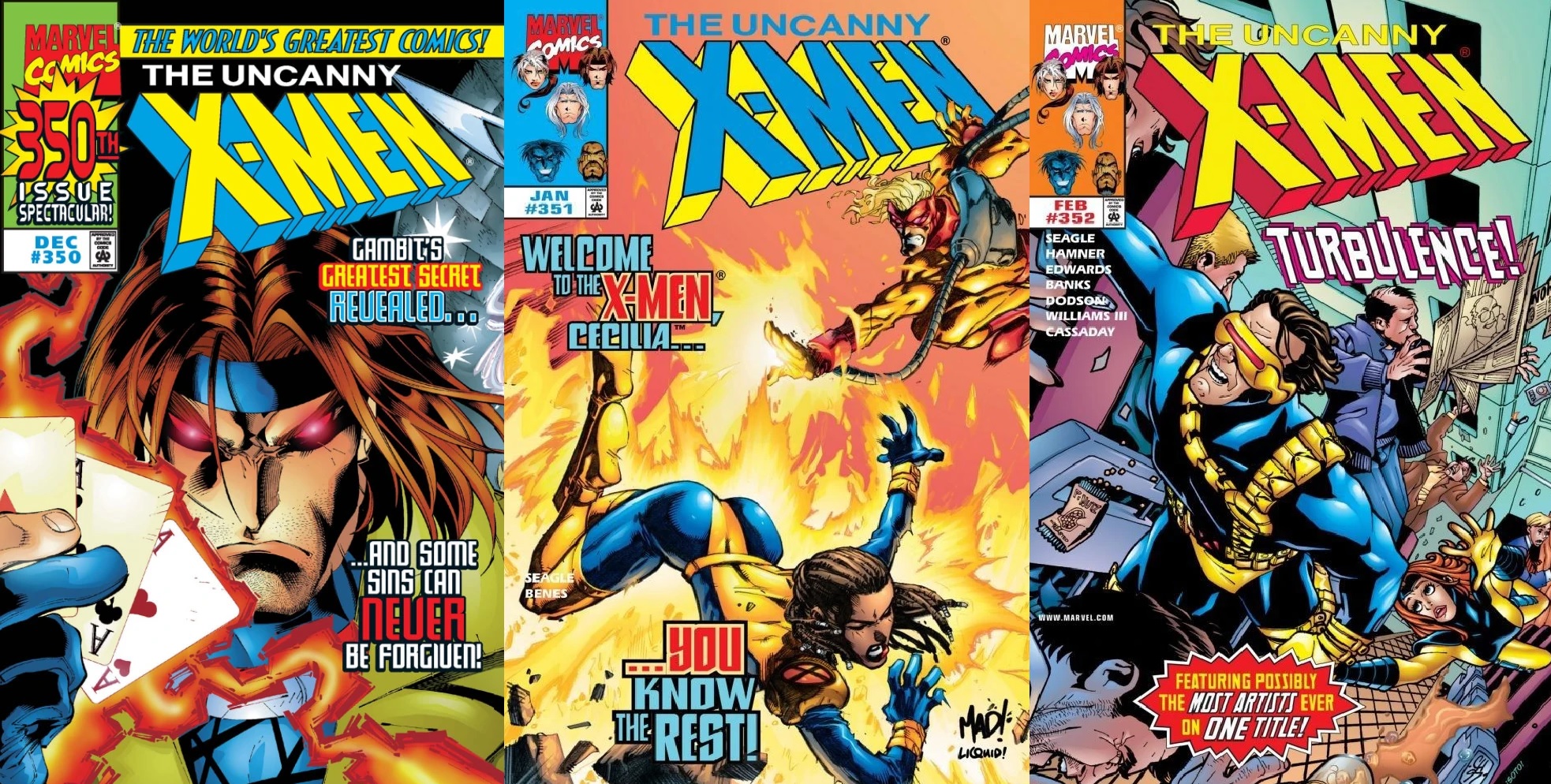

Steve Seagle is such a mixed bag as a writer. I have generally not loved his run on Uncanny, which tends to focus on smaller moments with a small group of characters. I think his writing is stiff and his plots are boring. But then I remembered that Uncanny was the title that did a focus issue on the mutant healer Cecilia Reyes, one of my favorite characters in the current X-Men team. And he forwarded the plot of the X-Men titles by depicting the trial of Gambit in Antarctica. And his one-off story about Jean & Grey fighting a psychic force on an airplane was pretty fun. Uncanny's had some lows (I really didn't care for the number of times it encouraged me to go read Seagle's other book, Alpha Flight), but it's had some decent stuff too.
Untold Tales of Spider-Man: Strange Encounter #1
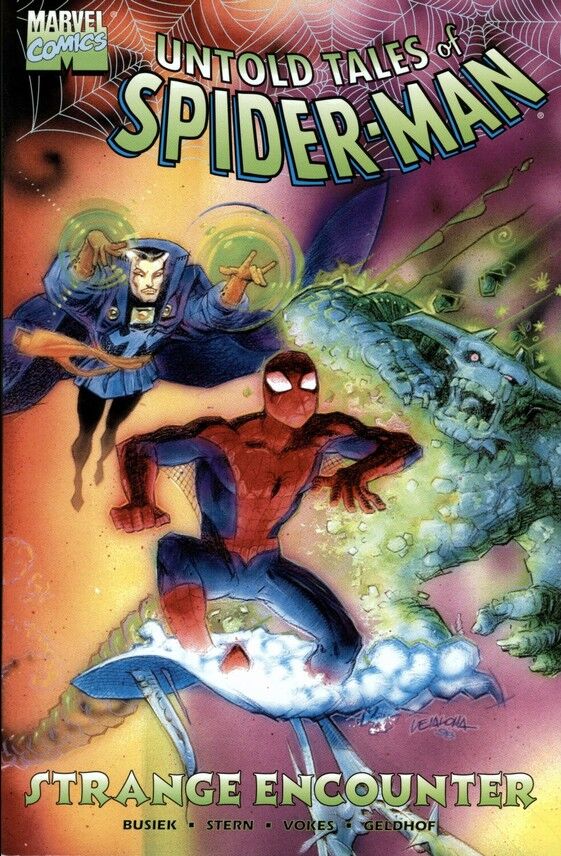
Here's an oversized one-shot meant to briefly take the place of the recently-cancelled series "Untold Tales of Spider-Man," which featured side stories from early in Spider-Man's career. This one-shot has Spidey and a lot of his supporting cast trapped in a spirit realm along with Doctor Strange for a little while. It's decently fun, the kind of classic fun you'd expect from Kurt Busiek, tempered by the presence of co-writer Roger Stern but brought beautifully to life from the surreal art of Neil Vokes.
Werewolf by Night vol 2 #1-6

First Paul Jenkins writing of the project! I like him, he's generally pretty entertaining, and so is Werewolf By Night. As with Man-Thing, the art is dark and twisted and evocative, and it all illustrates a story where the titular monstrous protagonist must go on a journey to find a bunch of McGuffins in different places. There's a sequence in the middle where werewolf Jack Russell takes a carnival ride to Hell and confronts his inner demons, which is really strong stuff.
Of course the series ends on a cliffhanger, and curiously with the same plot beat that vampire Hannibal King faced in Journey Into Mystery: Jack wakes up to find that he's killed somebody for the first time ever. Kinda feels like that should have come up at some point before in this character's long history?
What If vol 2 #105-111
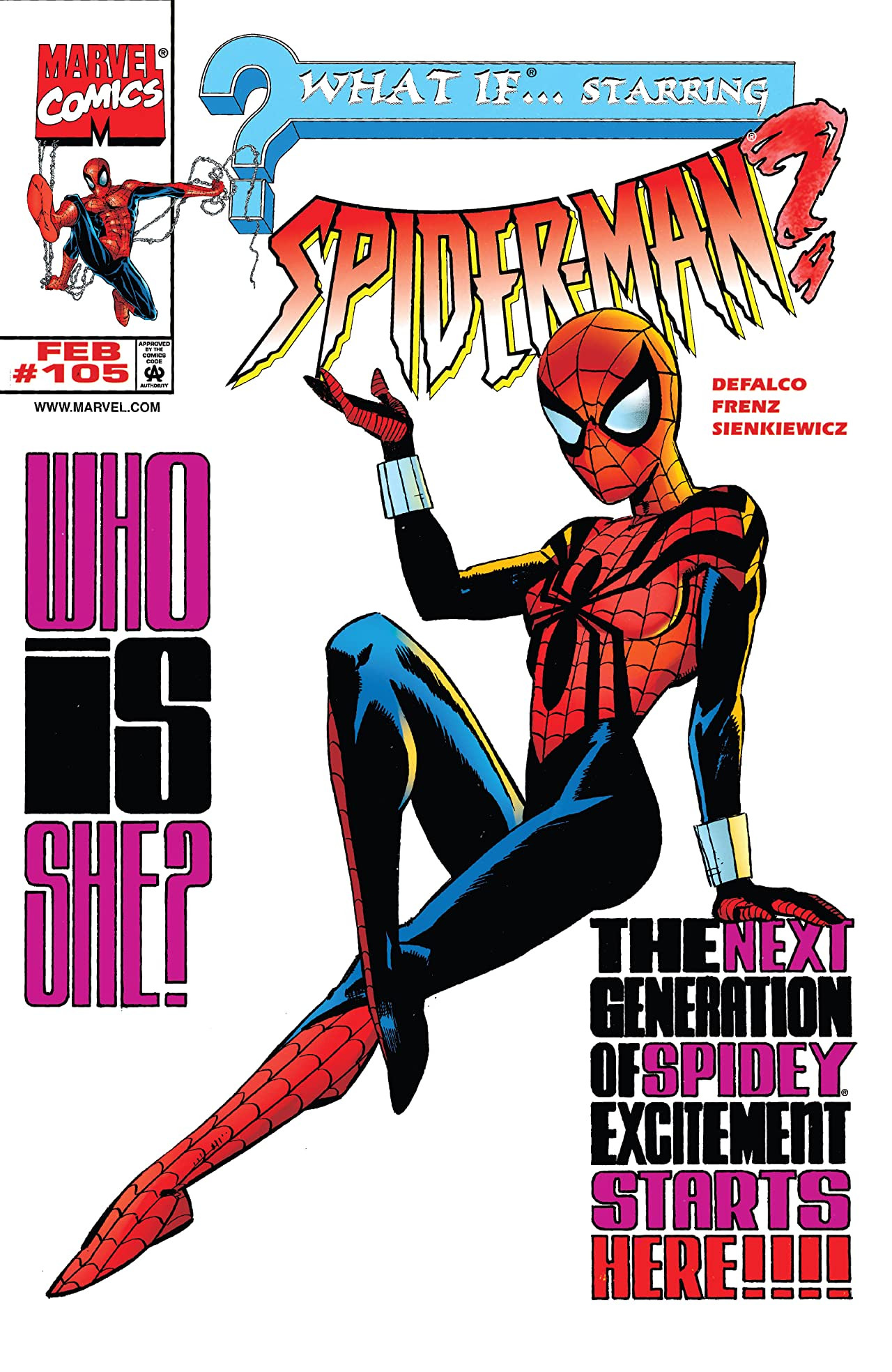

I started reading with an issue I was really excited for - Tom DeFalco wrote issue #105, which introduces May Parker, the alternate-reality daughter of Peter Parker and Mary Jane. In this issue, she takes up her father's legacy and becomes the new Spider-Girl. Much like Amazing Fantasy, this issue would become so popular that it would spin off into its own series, which would launch later in 1998.
None of the other issues of What If that I've read reach that high bar, but many come close. I've previously read a few issues of What If from the mid-2000s, and they tend to be pretty dark. But here, What If refuses to ignore these characters' essential goodness and the hope that they represent.
In one issue, DeFalco wonders what would happen if the X-Men were harder on Gambit after he betrays the team. In the end, they're unable to truly hurt him because he's still their friend. In another issue, Apocalypse turns Wolverine into a brainwashed villain, inadvertently creating an enemy large enough to rally the world against him and bring about an everlasting peace. But that doesn't end in Wolverine's death; it's revealed that he broke free of the brainwashing and is searching for his own inner peace.
Of course some issues are downers, but in those cases it kinda feels like the characters had it coming. Perhaps the most tragic issue of this bunch is the one starring the Fantastic Four, in which the Thing decides to abandon his teammates for a happy life with Alicia Walters in a tiny villain-created utopia, ignoring the battle they must face and lying to Alicia about the true nature of their peace. The story ends with his teammates dead, Alicia distraught, and the Thing trapped in his false utopia, giving him karmic retribution for his actions.
Wolverine vol 2 #119-127, Annual 1997
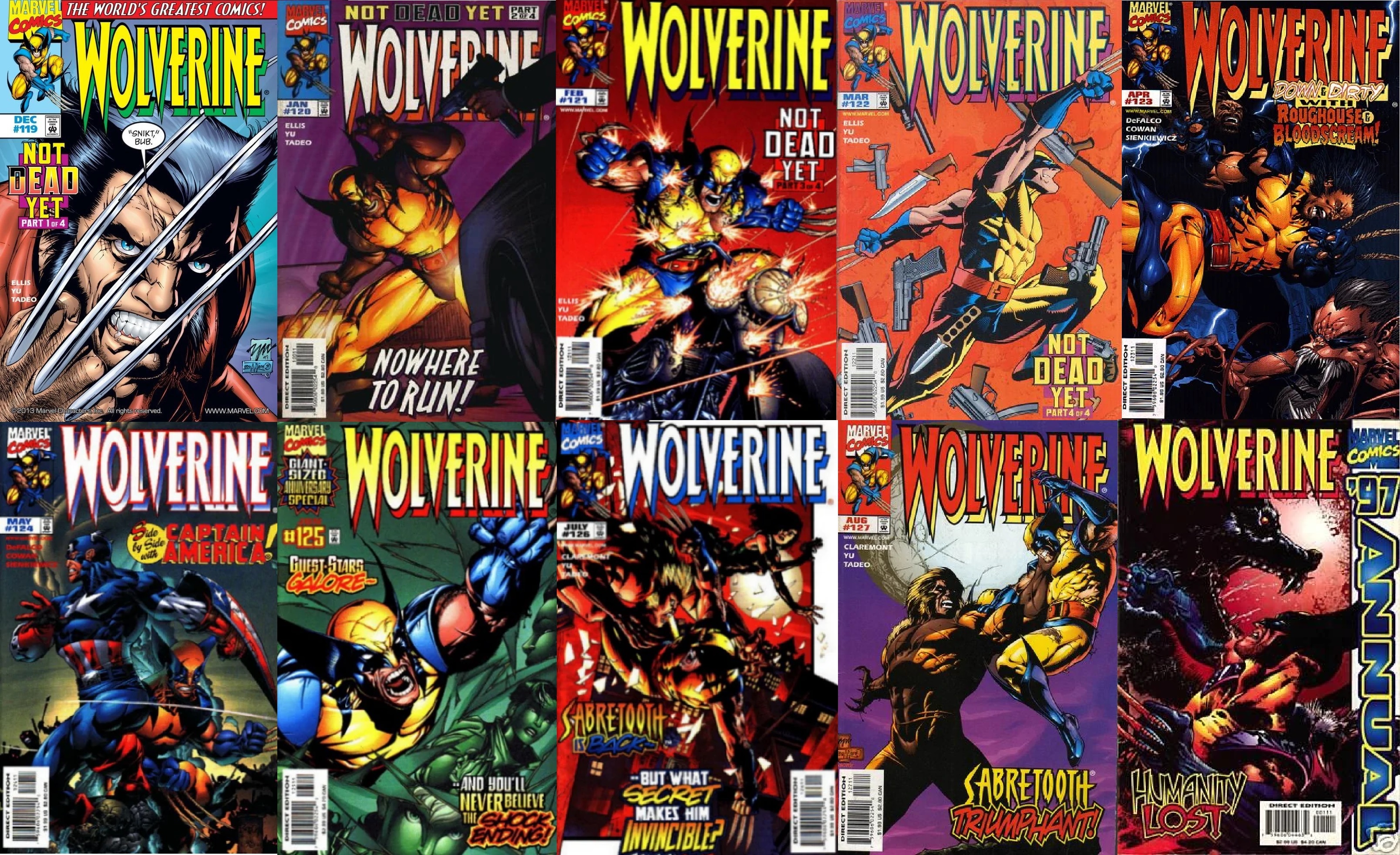
Even before the X-Men movie in 2000, Wolverine is one of Marvel's most popular characters. So with a Wolverine series, Marvel can do pretty much anything they want. What they've elected to do here is give the reins to a new writer every story arc.
Warren Ellis takes the first four issues, a tale called "Not Dead Yet" which sees Wolverine tracking down and fighting a murderous asshole he used to go drinking with. The dialogue is sparse but the writing is *on point* and Leinil Yu's art is bold, so it's kinda one of my favorite self-contained arcs I've read in this project.
After a brief interlude from John Ostrander & Joe Edkin for the annual (it's pretty good, it focuses on Wolverine's ability to lose control), Tom DeFalco takes the reins for a couple of one-off issues. The first one pits him against Roughouse and Bloodscream, two villains DeFalco also used over in Amazing Spider-Man. I don't know why DeFalco cares about them, they're pretty boring. The second is a crossover with Captain America. Both are fine.
Then Chris Claremont takes over, and... y'know, Claremont's praised as one of the best X-Men writers of all time, but between this and his work over in Fantastic Four this year, I really do not see it. The plot is that Wolverine's been manipulated into making good on a promise he made to marry Viper. Several of the women in his life try to stop him, and Kitty Pryde sticks around for the immediate fallout. It's kind of gross? I mean, Kitty's one of my favorite characters, I'm all for seeing her in more comics, but she kinda just gets used by the villain here, and Viper is just a bitch. And the story's super unfocused too, Wolverine takes an entire issue to mess with some Hydra goons for reasons seemingly unrelated to the main story. Ugh.
X-Factor #140-148
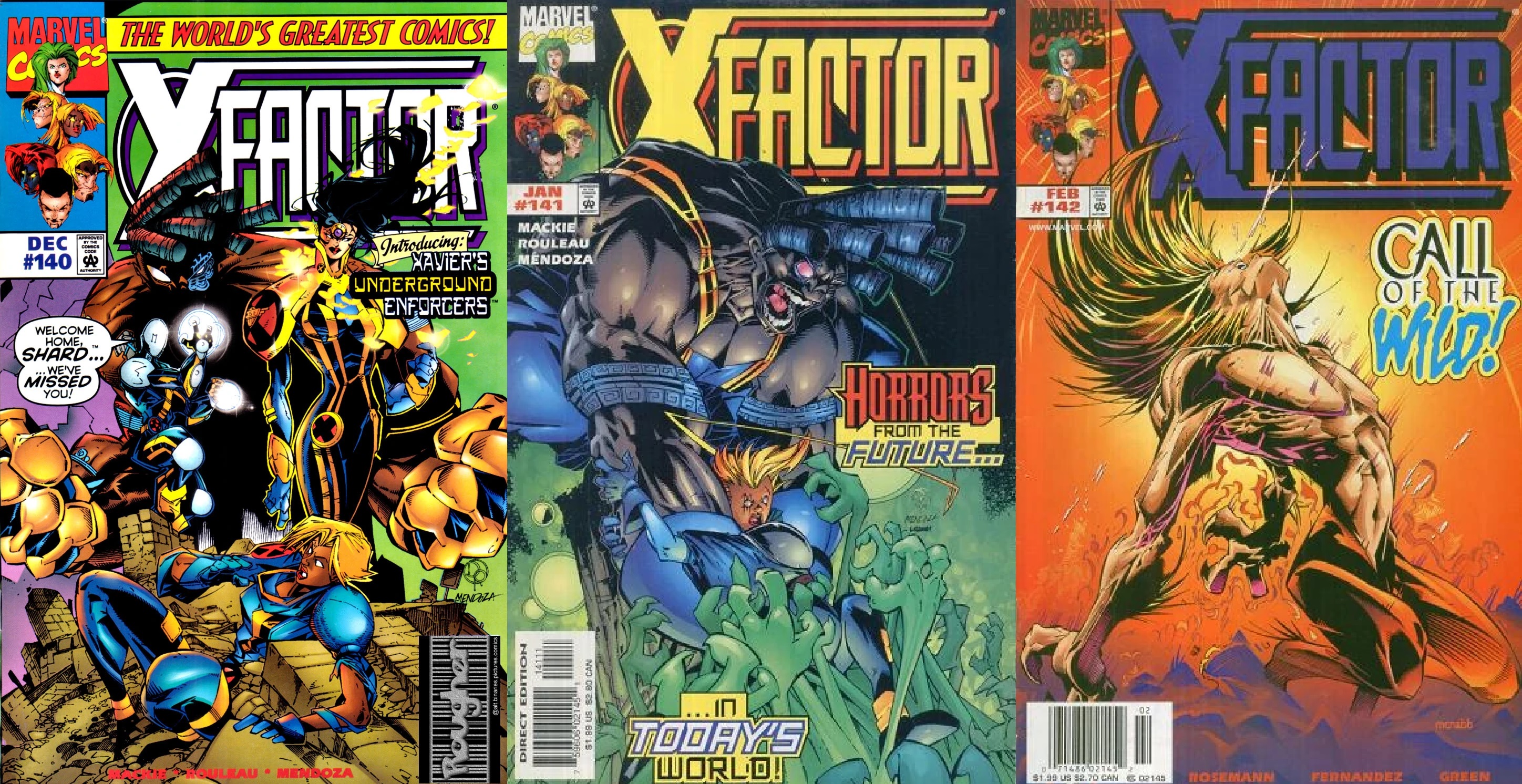

For a series that's one of my favorites when it relaunches as a scrappy detective noir series in the 2000s, this iteration of X-Factor is really not doing it for me. There really wasn't a perfect jumping-on point for me to start reading this series cause it's all kind of a mess, so I did the best I could and read these nine issues.
Maybe the biggest problem of the main stuff is that I just don't care about the main cast. Wildchild, Dark Beast, Alex Summers, and Polaris are all kinda boring. Even Madrox doesn't manage to make things much better in his one appearance. It's a shame because series writer Howard Mackie is also working on adjectiveless Spider-Man, and he's doing a much better job over there. Maybe he was just dealt a bad hand.
The biggest plot-related thing that happens is a group of mutants from the future called the Xavier Underground Enforcers (not to be confused with the group they split off from, the Xavier Security Enforcers) arrive in the present in the bodies of new people whose identities they've now erased. There's some business where the characters visit the old lives of the people they've bodysnatched and try to make things better, but it's pretty messy.
The highlight of the series so far might be #147, written by guest writer Joseph Harris, about the mutant Shard trying to help out a bullied kid whose classmates think he's a mutant. Once he finds out he's not a mutant but is actually just double-jointed, he joins in with his classmates to bully Shard. That's a pretty sad but ultimately cohesive little story.
X-Force #70-80


The original point of this comic was that it was Cable's special spin-off team that he led in order to help him stop the bad stuff that would cause chaos in his home timeline. At the point when I started reading, X-Force decided they wanted to do their own thing, and Cable left to have adventures on his own.
So now X-Force, written almost entirely by John Francis Moore, is the slightly older edition of Generation X: a group of young people dealing with things separately from the main X-Men cast. While Gen X focuses on the whimsy of children, the X-Force team deals with plots and themes more appropriate for its slightly older cast in their teens and 20s. X-Force goes on a road trip, visits a Woodstock-esque festival, and grapples with their inner demons. Warpath has an extended arc in which he seeks out the people who massacred his village, gets killed, and is resurrected. Then Sunspot has a few issues in which he deals with a darker version of himself, Reignfire, who claims to be the same person as Sunspot and briefly possesses him.
Like with X-Factor, it could be a cast thing, where they haven't really chosen characters that I care about. Maybe if I'd been following since this team debuted in New Mutants Vol 1, I'd be more emotionally invested. I like Domino, but her subplot only shows up every so often.
It could also be that these characters have enough wealth and power that it doesn't really feel like they're struggling. They go on a cross-country trip without much trouble, and their funding being cut off is only a brief problem. The book just feels kind of dated (which the Woodstock bash doesn't help), and the characters are unlikeable and unrelatable. I hope the series gets better.
X-Man #31-41


This was so close to being my least favorite title of the project. Only Elektra managed to beat it out at the last minute.
For a start, it's a grim gritty superhero being really really angsty about how cursed he is to have all these superpowers and be such a beloved figure. Literally, there's an arc about halfway thru this stretch where Nate's really angsty about that, and then the Purple Man proves him right by manipulating people to first love him and then hate him. Oh my gods, get over yourself.
But that's not what makes this series so bad. What I absolutely loathed was how it treats characters with mental illness. In two cases, with the villains Hybrid and Jackknife, Nate makes them more mentally unstable with his psychic powers. Rather than helping them, Nate just hits them for a while until they stop fighting him, either because of serious bodily harm or flat-out disintegration. Nate doesn't really come to terms with what he's done and certainly doesn't seek to make amends. It's just presumed that we won't sympathize with the ultimate fate of the villains because they're, well, *crazy*. And this isn't some kind of undetailed undescribed insanity, either - these characters have clear cases of multiple personality disorder, repression, and schizophrenia. And these characters are left to suffer, even more than before Nate interacted with them. Writer Terry Kavanagh should be ashamed of this work.
X-Man & Incredible Hulk Annual 1998
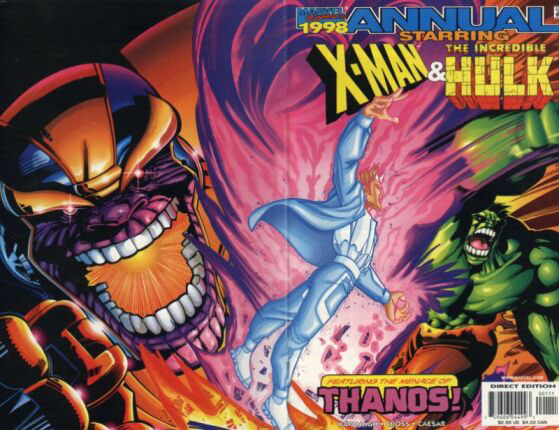
This annual is better than the X-Man ongoing because Hulk is in it, mostly calling the shots, and because the villain isn't a mentally ill person but fucking Thanos, still trying to break out of his cosmic prison from the Ka-Zar series. Nate continues to attempt to fuck things up as royally as possible, but Hulk's too competent to be kept down, and Thanos doesn't manage to break out. Thank the gods.
X-Men vol 2 #70-78
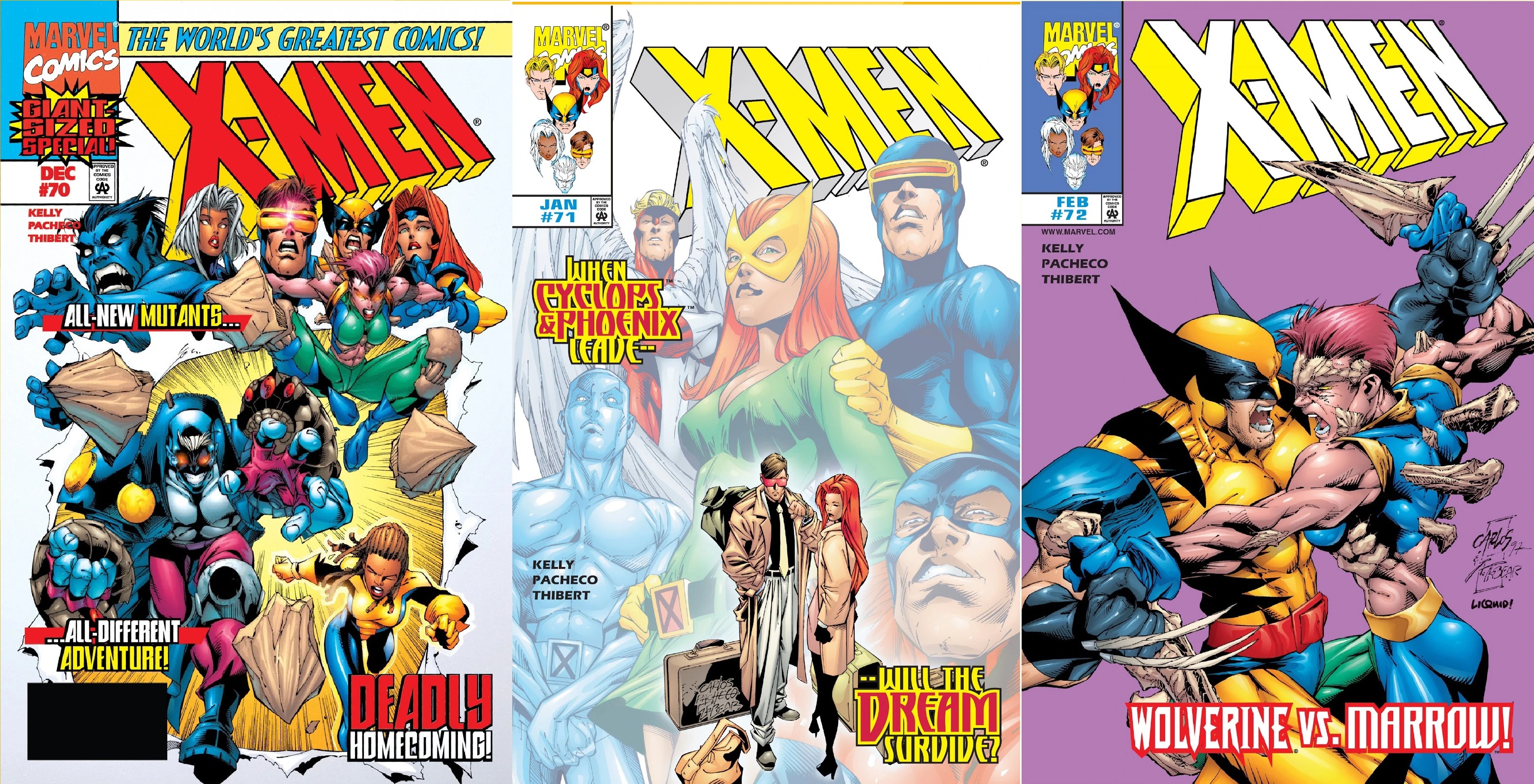

Whereas Uncanny tells little side stories about the main cast of X-Men, the adjectiveless X-Men title is more focused. From month to month, its cast is the main group of X-Men hanging out at the mansion, which is stronger than Uncanny's approach because the main team has a few unusual characters that shake up the dynamic a bit. Specifically, Marrow and Maggot and Cecilia Reyes are all relatively new additions to the team, and a lot of the drama involves them trying and occasionally failing to fit in with their peers.
Appropriately, this title is also where we get more relevant plot developments. The mutant following the X-Men around who thinks he's a reformed Magneto finds out he's actually somebody else. (This will come back around in an event in a few months.) A call for help that brings Storm and the X-Men to Africa results in Psylocke setting off a massive psychic trap, which is felt by several characters across titles such as X-Man and Generation X.
It feels like, if you wanted to follow just one X-book to know what was going on at the time, this would be the one you'd pick up. And I really liked it. I think Joe Kelly takes the time he needs to flesh out characters - little interactions like Wolverine bonding with Maggot and Angel talking down Marrow are pretty heartwarming, cause it feels like they're being brought into the fold even tho both Marrow and Maggot look pretty gross and feel like they're outcasts. But then Kelly also folds these into larger plot beats; the oversized 75th issue shows them tracking down the murderers who framed Maggot, and it's an appropriate catharsis given how much Maggot's struggled throughout the course of this title.
So not only is this the essential X-book to read if you only wanted to read one X-book in 1998, but it's my pick for the best of the X-books. All of the other series feel compromised in some way, but X-Men managed to make me love characters I'd never heard of before with kinda gross powersets. That's what X-Men should be at its best - a family where you weren't expecting one.
X-Men & Alpha Flight vol 2 #1-2
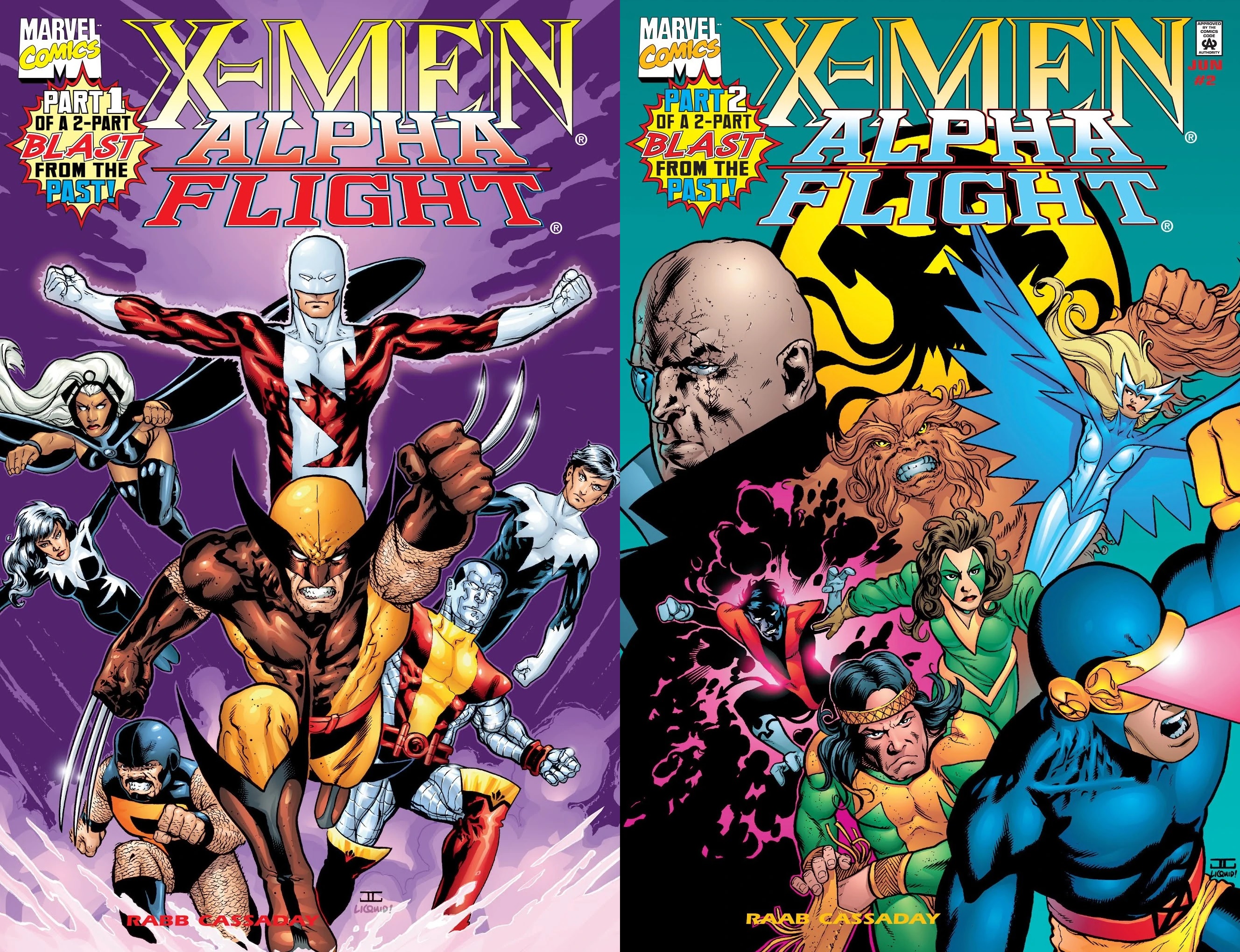
Because Marvel loves Alpha Flight, here's another X-Men / Alpha Flight crossover, an untold story from early in both team's runs. (This isn't even the first time they've done this, what the heck?) It's fine, and at least Seagle isn't writing this one, but I really question the necessity of so much Alpha Flight if they aren't going to bother to make those characters very likeable or interesting.
X-Men & Dr. Doom Annual 1998
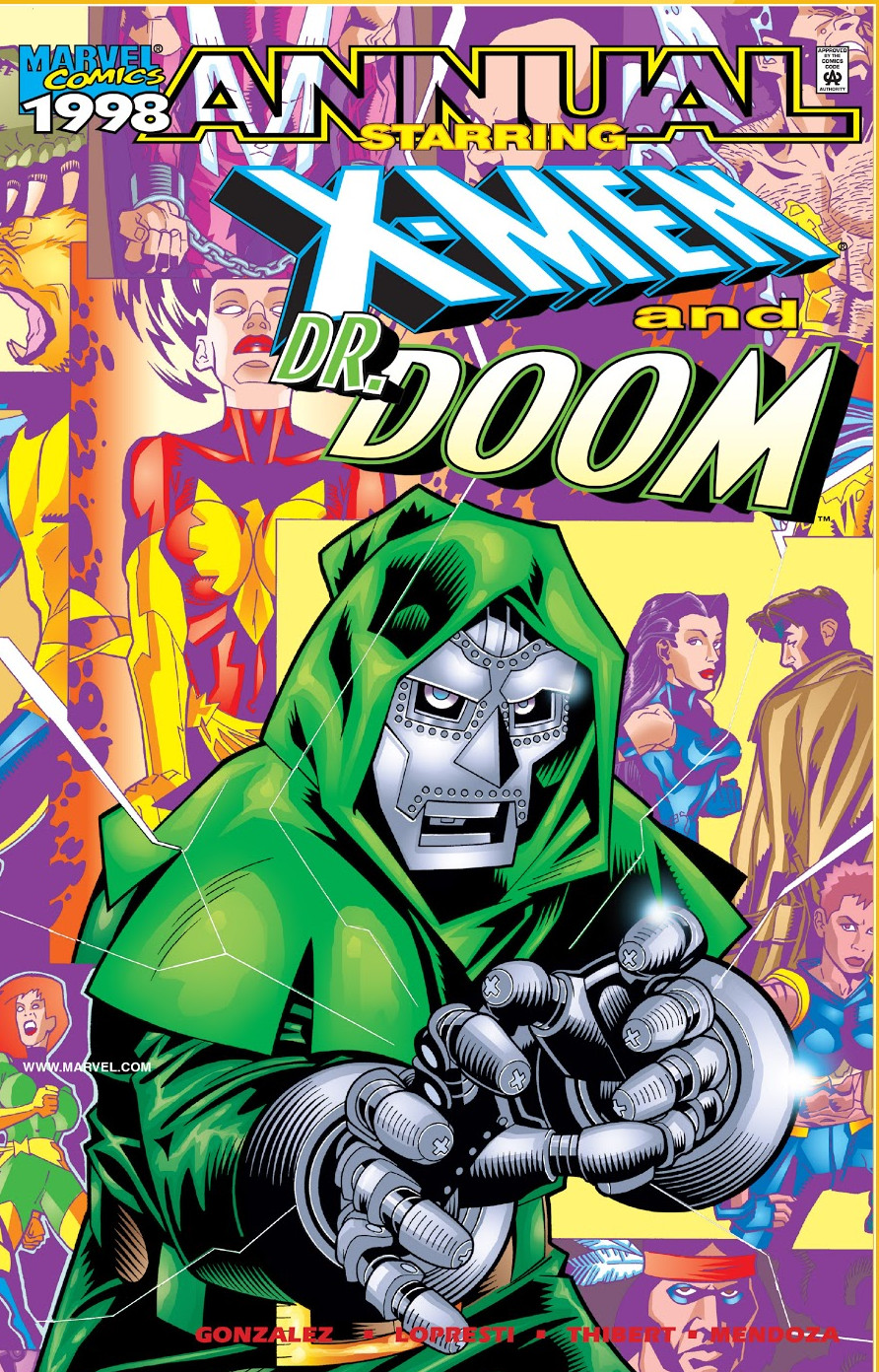
It's not a team-up (altho Doom does fight Magneto briefly), it's Doctor Doom going thru the X-Men's history looking for power sources, learning how Onslaught was created, and vowing to use this knowledge at some point in the future. Really, who really knows if that's going to come to fruition, Marvel writers do this a lot where they set up that some villain will follow thru on something and then no future writer is actually interested in doing so. It's not a bad issue but there's not much point to it.
X-Men Unlimited #18-19
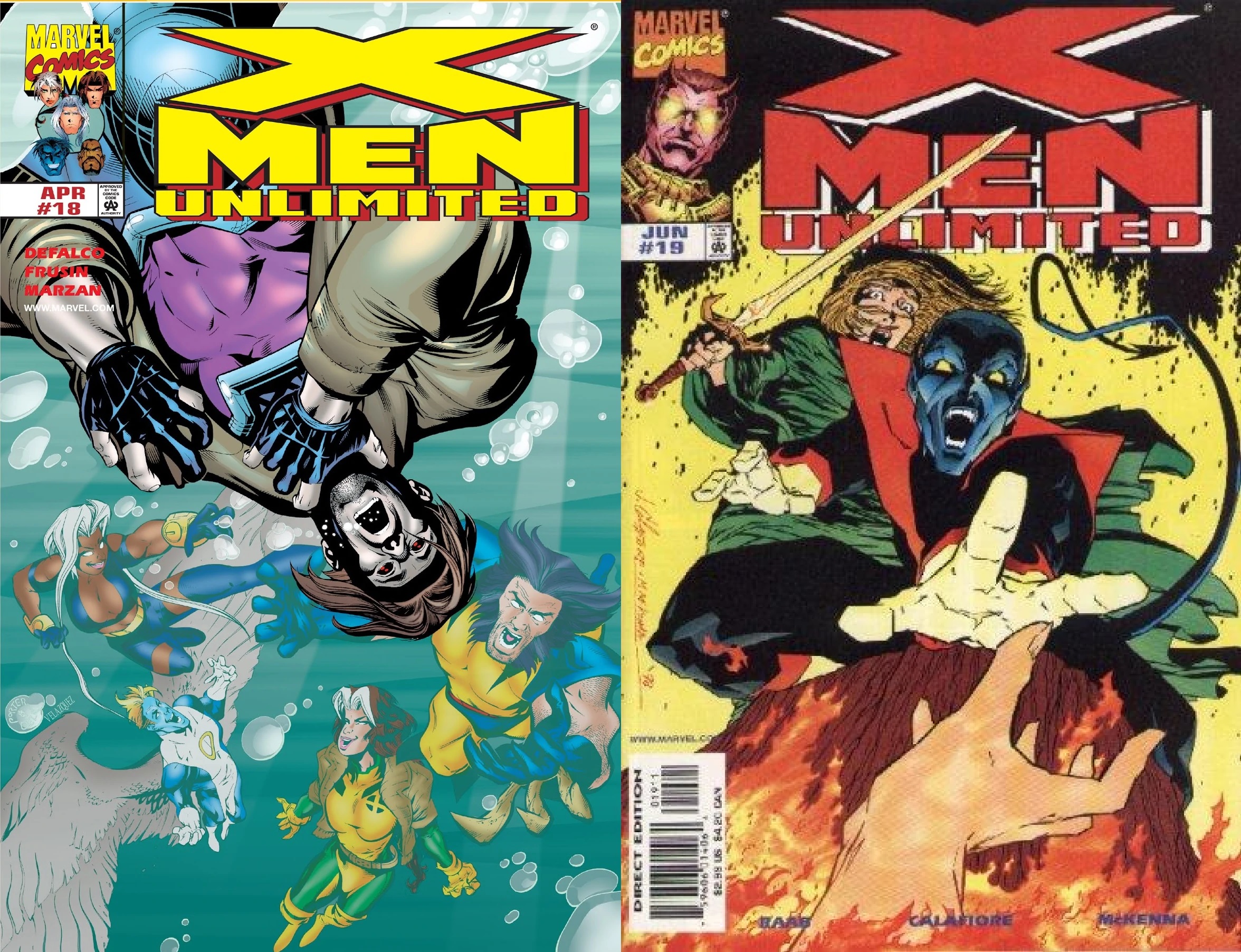
Now, the X-Men have so many characters that there's actually a pretty good reason for them to have a series based entirely in short stories, more so than there is for Spider-Man.
Issue #19 is a story in which Nightcrawler rescues his love interest from Hell. It doesn't have any immediate consequences in the X-books, but it looks like she's going to stick around.
Issue #18 has much more immediate and interesting consequences. The B-story is about Marrow, and shows what she's up to when she steals away from the main group of X-Men and hides out in the sewers. It's a really good way of setting up what's going on with her before Angel ultimately confronts her in the main X-books, and made me care just that little bit more about her character.
The A-story is about Gambit, and the immediate fallout of the X-Men abandoning him in Antarctica. This hit shelves very close to the time when What If did a feature on an alternate reality in which the X-Men swore vengeance against him, and between these two issues, I'm actually pretty hyped to see what'll happen to Gambit next. That may have been the design, because Gambit has an ongoing series that launches later in 1998. But hey, if it works it works. Good showing overall from this title, and a fair bit stronger than Spider-Man Unlimited was.
Next time: Several long-running series come to a close! The Marvel Knights line starts up, as does Spider-Girl and her various spin-off series! And a Heroes for Hire & Quicksilver crossover event, of all things!